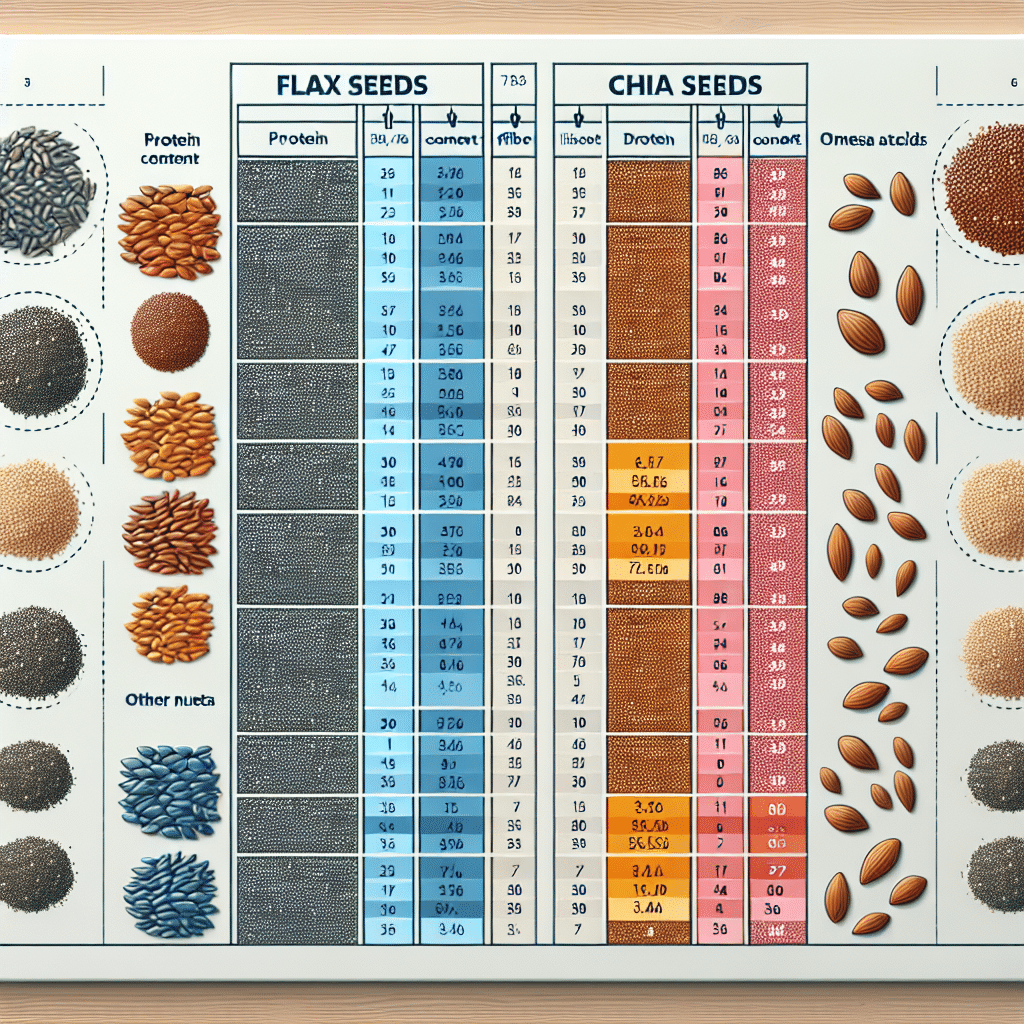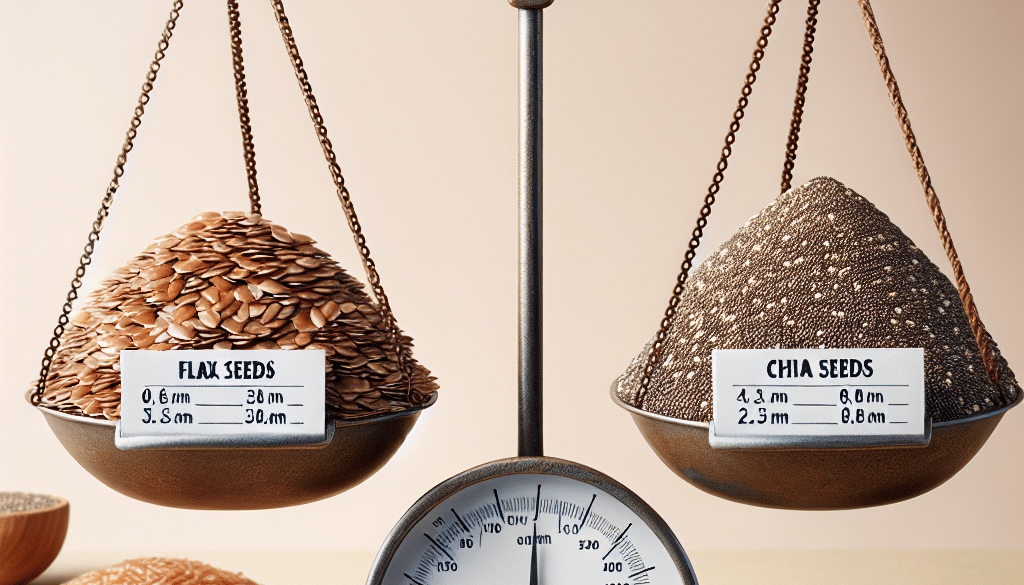Are Flax Seeds Better Than Chia Seeds For Protein? Learn More
Table of Contents
- Flax Seeds vs. Chia Seeds: Which Packs More Protein?
- Understanding Protein in Seeds
- Protein Content: Flax Seeds vs. Chia Seeds
- Nutritional Benefits Beyond Protein
- Flax Seeds
- Chia Seeds
- Practical Considerations in Consumption
- Environmental and Sustainability Factors
- Conclusion: Balancing Protein and Overall Nutrition
- Discover ETprotein’s Range of Plant-Based Proteins
Flax Seeds vs. Chia Seeds: Which Packs More Protein?

When it comes to plant-based sources of protein, seeds are often a go-to choice for those looking to supplement their diet with healthy, lean protein. Among the plethora of options, flax seeds and chia seeds stand out due to their nutritional profiles and health benefits. However, a common question arises: which of these seeds is better for protein intake? This article delves into the nutritional aspects of flax seeds and chia seeds, comparing their protein content and discussing other health benefits to help you make an informed decision.
Understanding Protein in Seeds
Protein is a vital macronutrient necessary for building and repairing tissues, making enzymes and hormones, and supporting overall health. Plant-based proteins, such as those found in seeds, are increasingly popular as they also offer fiber and essential fatty acids. Flax seeds and chia seeds are two prominent examples that are not only rich in protein but also in other nutrients.
Protein Content: Flax Seeds vs. Chia Seeds
When comparing the protein content of flax seeds and chia seeds, it’s essential to look at the numbers. Per 100 grams, flax seeds contain approximately 18 grams of protein, while chia seeds offer around 17 grams. Although the difference is minimal, flax seeds have a slight edge in terms of protein quantity. However, the quality of protein is also crucial, as it depends on the presence of essential amino acids that the body cannot synthesize on its own.
- Flax Seeds: Flax seeds are a good source of amino acids, but they may not contain all essential amino acids in sufficient quantities.
- Chia Seeds: Chia seeds are considered a complete protein, meaning they contain all nine essential amino acids in adequate proportions.
Therefore, while flax seeds may have a higher protein content by weight, chia seeds provide a more balanced amino acid profile, which is important for those relying on plant-based proteins as a significant part of their diet.
Nutritional Benefits Beyond Protein
Protein content is just one aspect of the nutritional value of these seeds. Both flax seeds and chia seeds offer a range of other health benefits that should be considered.
Flax Seeds
- Rich in alpha-linolenic acid (ALA), an omega-3 fatty acid that is beneficial for heart health.
- High in lignans, which have antioxidant properties and may reduce the risk of certain cancers.
- Contains soluble fiber, which can help lower cholesterol levels and improve digestive health.
Chia Seeds
- Exceptional source of dietary fiber, promoting digestive health and aiding in weight management.
- High in antioxidants, which help combat oxidative stress and inflammation.
- Contains a good balance of omega-3 and omega-6 fatty acids, contributing to cardiovascular health.
Both seeds are also low in carbohydrates and can be a part of a healthy diet for individuals with diabetes or those looking to control blood sugar levels.
Practical Considerations in Consumption
When incorporating flax seeds or chia seeds into your diet for protein, it’s important to consider how they are consumed. Flax seeds need to be ground to facilitate the absorption of nutrients, as whole flax seeds may pass through the digestive system undigested. Chia seeds, on the other hand, can be consumed whole and have the unique property of absorbing water, forming a gel-like substance that can be used as an egg substitute or to thicken recipes.
Environmental and Sustainability Factors
In the context of environmental sustainability, both flax seeds and chia seeds have a relatively low ecological footprint compared to animal-based proteins. They require less water and land to produce and emit fewer greenhouse gases. This makes them a more sustainable choice for those looking to reduce their environmental impact.
Conclusion: Balancing Protein and Overall Nutrition
In conclusion, while flax seeds may contain slightly more protein per 100 grams, chia seeds offer a complete protein with all essential amino acids. The choice between flax seeds and chia seeds for protein should also take into account their other nutritional benefits, how they fit into your overall diet, and personal preferences in taste and texture. Both seeds are versatile, nutrient-dense options that can contribute to a balanced and sustainable diet.
Discover ETprotein’s Range of Plant-Based Proteins
If you’re looking to diversify your protein sources further, consider exploring ETprotein’s selection of high-quality plant-based proteins. Their product lineup includes organic rice protein, pea protein, and various seed proteins, all characterized by a neutral taste and non-GMO, allergen-free attributes. With a commitment to purity and quality, ETprotein caters to a wide range of industries and dietary needs.
About ETprotein:
ETprotein, a reputable protein and L-(+)-Ergothioneine (EGT) Chinese factory manufacturer and supplier, is renowned for producing, stocking, exporting, and delivering the highest quality organic bulk vegan proteins and L-(+)-Ergothioneine. They include Organic rice protein, clear rice protein, pea protein, clear pea protein, watermelon seed protein, pumpkin seed protein, sunflower seed protein, mung bean protein, peanut protein, and L-(+)-Ergothioneine EGT Pharmaceutical grade, L-(+)-Ergothioneine EGT food grade, L-(+)-Ergothioneine EGT cosmetic grade, L-(+)-Ergothioneine EGT reference grade and L-(+)-Ergothioneine EGT standard. Their offerings, characterized by a neutral taste, non-GMO, allergen-free attributes, with L-(+)-Ergothioneine purity over 98%, 99%, cater to a diverse range of industries. They serve nutraceutical, pharmaceutical, cosmeceutical, veterinary, as well as food and beverage finished product distributors, traders, and manufacturers across Europe, USA, Canada, Australia, Thailand, Japan, Korea, Brazil, and Chile, among others.
ETprotein specialization includes exporting and delivering tailor-made protein powder and finished nutritional supplements. Their extensive product range covers sectors like Food and Beverage, Sports Nutrition, Weight Management, Dietary Supplements, Health and Wellness Products, and Infant Formula, ensuring comprehensive solutions to meet all your protein needs.
As a trusted company by leading global food and beverage brands and Fortune 500 companies, ETprotein reinforces China’s reputation in the global arena. For more information or to sample their products, please contact them and email sales(at)ETprotein.com today.














